On Jan. 1, 2019, two icons were set to meet at the Sugar Bowl in New Orleans. Yes, Georgia and Texas would face off, but that wasn’t the real draw. It was the meeting between the teams’ mascots — Georgia’s bulldog Uga and Texas’ longhorn steer Bevo — that ultimately captured the nation’s attention.
What began as a made-for-TV moment to fill airtime before kickoff ended up a near catastrophe, a showcase of the strength and majesty of the world’s most famous cow, a preview of the game to come and a tangible example of the incredibly thin line between comedy and tragedy. Above all, it became one of the iconic viral videos in bowl history.
Now SEC rivals, Georgia and Texas are set to play again this week for the first time since the great Bevo-Uga showdown, so we looked back on that famed meeting of mascots for a better understanding of what happened and why live mascots remain an indelible part of the culture of college football.
 Lowell Galindo, Longhorn Network play-by-play announcer: People get caught up in the moment, and honestly, who’s thinking that’s going to happen? Surely they’ve talked this through and have it all figured out, and there won’t be any issues, right? Wrong.
Lowell Galindo, Longhorn Network play-by-play announcer: People get caught up in the moment, and honestly, who’s thinking that’s going to happen? Surely they’ve talked this through and have it all figured out, and there won’t be any issues, right? Wrong.
 Jim Sigmon, Texas team photographer: I was kind of thinking, this is odd because usually other schools don’t bring their live animal mascots over to Bevo. That’s a big-ass animal. I just thought the whole thing was bizarre.
Jim Sigmon, Texas team photographer: I was kind of thinking, this is odd because usually other schools don’t bring their live animal mascots over to Bevo. That’s a big-ass animal. I just thought the whole thing was bizarre.
 Holly Rowe, ESPN sideline reporter: I saw Uga coming our way and thought, “Aww, what a sweet meet-cute for the mascots,” so I started filming it on my phone. Then things got wild.
Holly Rowe, ESPN sideline reporter: I saw Uga coming our way and thought, “Aww, what a sweet meet-cute for the mascots,” so I started filming it on my phone. Then things got wild.
 Tommy Tomlinson, Georgia fan and author of “Dogland: Passion, Glory, and Lots of Slobber at the Westminster Dog Show”: What’s the old Mel Brooks line? Tragedy is when I get a hangnail. Comedy is when you fall into a hole and die. Depending on which side you were on in this story, it could’ve been both.
Tommy Tomlinson, Georgia fan and author of “Dogland: Passion, Glory, and Lots of Slobber at the Westminster Dog Show”: What’s the old Mel Brooks line? Tragedy is when I get a hangnail. Comedy is when you fall into a hole and die. Depending on which side you were on in this story, it could’ve been both.
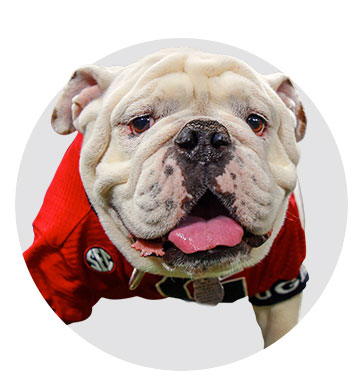 Charles Seiler, Uga’s owner and handler: People who’ve been in the mascot business, we don’t like to have problems with the mascots. But I can’t say they lost control because my butt was headed in the other direction.
Charles Seiler, Uga’s owner and handler: People who’ve been in the mascot business, we don’t like to have problems with the mascots. But I can’t say they lost control because my butt was headed in the other direction.
Part I: A history of live animal mascots
The story of Uga and Bevo’s meeting actually begins 140 years earlier. That’s when Yale’s bulldog Handsome Dan, widely regarded as college football’s first mascot, took to the field at Yale. The term “mascot” comes from the French word “mascotte,” which means “lucky charm,” and for dozens of schools around the country, Handsome Dan and other live animals were exactly that.
 Tim Brown, football historian: It was mostly dogs originally. But as teams started coming up with mascots like badgers or buffalo, it was almost like a prank initially. Some students would decide to get one and bring it to the game.
Tim Brown, football historian: It was mostly dogs originally. But as teams started coming up with mascots like badgers or buffalo, it was almost like a prank initially. Some students would decide to get one and bring it to the game.
 Seiler: When my dad started this thing, he actually smuggled the dog into the Florida State game, and the [newspaper] took some pictures of it. That game was 3-0, and Coach [Wally] Butts, I think kind of tongue-in-cheek, said to my dad, “That game wasn’t very interesting, so it’s good you brought that dog.”
Seiler: When my dad started this thing, he actually smuggled the dog into the Florida State game, and the [newspaper] took some pictures of it. That game was 3-0, and Coach [Wally] Butts, I think kind of tongue-in-cheek, said to my dad, “That game wasn’t very interesting, so it’s good you brought that dog.”
Nowadays, extreme care is taken in selecting just the right animal, and countless hours are spent training both the mascot and its handlers. But of course, incidents have happened along the way.
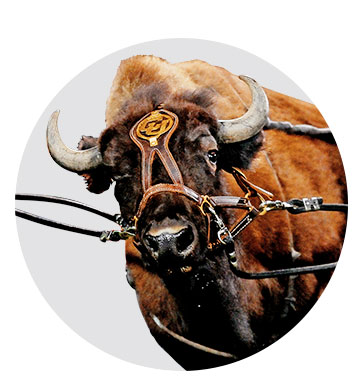 Taylor Stratton, handler for the Colorado Buffaloes’ buffalo, Ralphie: I talk to them as if they understand me, and the thing I was telling Ralphie VI is, “Oh no, all buffalo do this. It would be weird if you didn’t go to a stadium. This is normal.”
Taylor Stratton, handler for the Colorado Buffaloes’ buffalo, Ralphie: I talk to them as if they understand me, and the thing I was telling Ralphie VI is, “Oh no, all buffalo do this. It would be weird if you didn’t go to a stadium. This is normal.”
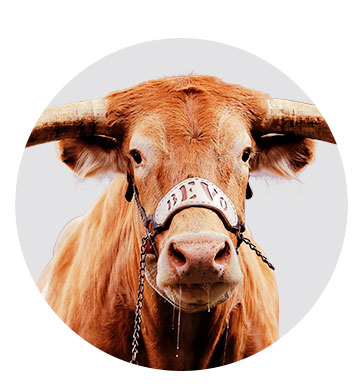 Ricky Brennes, executive director of the University of Texas Silver Spurs, handler for Bevo: A lot of it comes down to their natural temperament and disposition. Without that, it doesn’t matter too much. We took him to band practice, music playing in his pen, hung flags up in the barn to see how he’d react to different types of movement. The previous Bevo did not like flags at all.
Ricky Brennes, executive director of the University of Texas Silver Spurs, handler for Bevo: A lot of it comes down to their natural temperament and disposition. Without that, it doesn’t matter too much. We took him to band practice, music playing in his pen, hung flags up in the barn to see how he’d react to different types of movement. The previous Bevo did not like flags at all.
 Stratton: Because [Ralphie’s] so big and athletic, we do Division I-level strength and conditioning training. They’re doing sprint workouts, making sure their bodies are ready and functioning at peak athletic performance. … We go through different ways we run. Get your chest up and your knees up because you cannot run 25 mph, so you need to let the buffalo pull you while you’re in the air so when you hit the ground you can keep your feet and go as fast as you can.
Stratton: Because [Ralphie’s] so big and athletic, we do Division I-level strength and conditioning training. They’re doing sprint workouts, making sure their bodies are ready and functioning at peak athletic performance. … We go through different ways we run. Get your chest up and your knees up because you cannot run 25 mph, so you need to let the buffalo pull you while you’re in the air so when you hit the ground you can keep your feet and go as fast as you can.
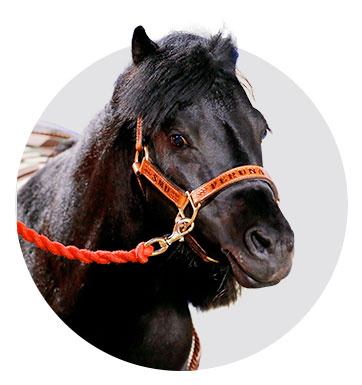 Adam Harper, handler for SMU‘s stallion, Peruna: The only time he’s not used to loud environments are flyovers, and that’s something we have to plan for. Like, “Be aware guys, Peruna is going to hate that.”
Adam Harper, handler for SMU‘s stallion, Peruna: The only time he’s not used to loud environments are flyovers, and that’s something we have to plan for. Like, “Be aware guys, Peruna is going to hate that.”
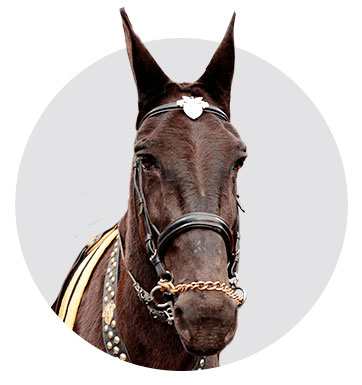 Peter Cashman, handler for Army‘s mules: Mules are funny animals. Certain things bother them and certain things don’t. They can be standing next to the cannon when it goes off, and it’s no problem. But if the wave starts behind them, and it’s in their peripheral vision, that bothers them.
Peter Cashman, handler for Army‘s mules: Mules are funny animals. Certain things bother them and certain things don’t. They can be standing next to the cannon when it goes off, and it’s no problem. But if the wave starts behind them, and it’s in their peripheral vision, that bothers them.
 Harper: We form a kind of circle around [Peruna] where it negates anybody from possibly walking behind him. That’s our one big rule: Do not walk behind Peruna.
Harper: We form a kind of circle around [Peruna] where it negates anybody from possibly walking behind him. That’s our one big rule: Do not walk behind Peruna.
 Cashman: We were at Army-Navy about five years ago, and for some reason, the whole Army team ran out right into the mules where we were standing. We had 50 football players amongst the mules, but nobody was hurt.
Cashman: We were at Army-Navy about five years ago, and for some reason, the whole Army team ran out right into the mules where we were standing. We had 50 football players amongst the mules, but nobody was hurt.
 Seiler: Baylor used to bring out a bear cub. Uga walked up to sniff the bear’s butt, and he spun around and, damn if he didn’t spin Uga like a top. I don’t think they can possibly bring a cub anymore.
Seiler: Baylor used to bring out a bear cub. Uga walked up to sniff the bear’s butt, and he spun around and, damn if he didn’t spin Uga like a top. I don’t think they can possibly bring a cub anymore.
 Cashman: The biggest part is keeping [the mules] hidden from Navy. On the road, I have to find a location that is secretive and nobody is going to tell Navy where the mules are. We go in with an unmarked trailer. And it’s the same with the [Navy] goats.
Cashman: The biggest part is keeping [the mules] hidden from Navy. On the road, I have to find a location that is secretive and nobody is going to tell Navy where the mules are. We go in with an unmarked trailer. And it’s the same with the [Navy] goats.
 Harper: Before I took the job, one person pulled me aside and said, “This is what happened to me.” He was running with Peruna, and he tripped and fell. We’re tasked to hold on to the reins no matter what, because if Peruna gets loose, you’re not catching him. So if you fall, let him drag you. Just hold on. That’s all that matters. Anyway, he fell at the 40-yard line, and was dragged by Peruna all the way to the end zone. He scored a touchdown. He had a nasty bruise down the side of his body.
Harper: Before I took the job, one person pulled me aside and said, “This is what happened to me.” He was running with Peruna, and he tripped and fell. We’re tasked to hold on to the reins no matter what, because if Peruna gets loose, you’re not catching him. So if you fall, let him drag you. Just hold on. That’s all that matters. Anyway, he fell at the 40-yard line, and was dragged by Peruna all the way to the end zone. He scored a touchdown. He had a nasty bruise down the side of his body.
 Brennes: We had a moment walking Bevo off the field against Nebraska in the Big 12 championship game, and he defecated on the word “Nebraska” when we were walking him off.
Brennes: We had a moment walking Bevo off the field against Nebraska in the Big 12 championship game, and he defecated on the word “Nebraska” when we were walking him off.
 Harper: The pooping on TCU‘s field gets talked about still. People still come up and say, “Don’t let [Peruna] poop on the field.” It adds to the celebrity status.
Harper: The pooping on TCU‘s field gets talked about still. People still come up and say, “Don’t let [Peruna] poop on the field.” It adds to the celebrity status.
 Michael Griffin, former Texas player and Longhorn Network analyst: If I’m not mistaken, didn’t Uga bite somebody before?
Michael Griffin, former Texas player and Longhorn Network analyst: If I’m not mistaken, didn’t Uga bite somebody before?
 Tomlinson: That’s the one where if you go into a dive bar in Georgia, that photo or a painting of it will be on a wall somewhere. That’s one of the top moments, because it’s a literal manifestation of the rivalry. We want to eat the other team. Uga stood in for all of us that day.
Tomlinson: That’s the one where if you go into a dive bar in Georgia, that photo or a painting of it will be on a wall somewhere. That’s one of the top moments, because it’s a literal manifestation of the rivalry. We want to eat the other team. Uga stood in for all of us that day.
 Seiler: Auburn hates that [picture]. For five years after that, they put someone on me to make sure I didn’t get that close to the field again.
Seiler: Auburn hates that [picture]. For five years after that, they put someone on me to make sure I didn’t get that close to the field again.
 Brennes: One of the funniest Bevo moments … was Jordan Shipley jumping into Bevo’s pit on a punt return [at Darrell K. Royal Stadium].
Brennes: One of the funniest Bevo moments … was Jordan Shipley jumping into Bevo’s pit on a punt return [at Darrell K. Royal Stadium].
Why do I feel the urge to do a Tech post today?
Jordan Shipley visits Bevo after a 46 yard Punt Return TD against Texas Tech
Sept 19, 2009#HookEm pic.twitter.com/uvFsvYc1sb— Longhorn🤘Highlights (@LonghornClips) August 24, 2023
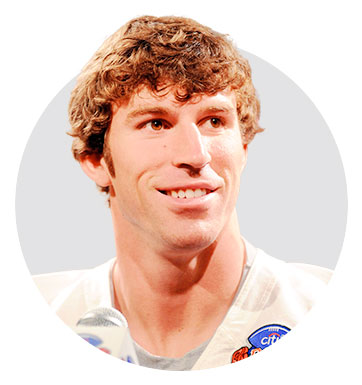 Jordan Shipley, former Texas player and Longhorn Network analyst: It was a short punt, and I already had some speed built up. It ended up being a footrace to the pylon, and I hit the end zone running full speed. In the moment, you don’t think about it, but I had to hop over a couple things, and by the time I look up, I’m literally right in front of Bevo. I put my hands up and hit his horns and jumped back out of there. He was pretty lethargic that day, thank goodness. It was a quick, “OK, I’m going to get out of here.”
Jordan Shipley, former Texas player and Longhorn Network analyst: It was a short punt, and I already had some speed built up. It ended up being a footrace to the pylon, and I hit the end zone running full speed. In the moment, you don’t think about it, but I had to hop over a couple things, and by the time I look up, I’m literally right in front of Bevo. I put my hands up and hit his horns and jumped back out of there. He was pretty lethargic that day, thank goodness. It was a quick, “OK, I’m going to get out of here.”
 Harper: Peruna killed a mascot in the 1930s. I stepped on campus, and the first thing our administration told the new students is that our mascot is Peruna, and he killed the Fordham ram. That’s legendary.
Harper: Peruna killed a mascot in the 1930s. I stepped on campus, and the first thing our administration told the new students is that our mascot is Peruna, and he killed the Fordham ram. That’s legendary.
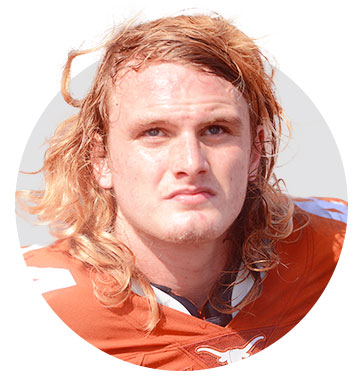 Breckyn Hager, Texas defensive lineman: Well, it’s good Bevo kept it classy.
Breckyn Hager, Texas defensive lineman: Well, it’s good Bevo kept it classy.
Part II: The photo op
In college football history, few mascots resonate among the masses like Uga and Bevo, who’ve been a part of their respective programs for generations. The history between bulldogs and bulls, however, goes back much further.
 Tomlinson: Wild bulls are huge, ornery animals that are hard to control, especially in frontier days. These dogs were bred to be fearless, and bred physically to have flat faces so they could literally run up to the bull, grab its nose with its teeth and drag its head to the ground.
Tomlinson: Wild bulls are huge, ornery animals that are hard to control, especially in frontier days. These dogs were bred to be fearless, and bred physically to have flat faces so they could literally run up to the bull, grab its nose with its teeth and drag its head to the ground.
 Brennes: Bevo doesn’t hate dogs. Bevo’s not familiar with what bulldogs are bred for, and let’s be honest, that was bred out of English bulldogs a long time ago.
Brennes: Bevo doesn’t hate dogs. Bevo’s not familiar with what bulldogs are bred for, and let’s be honest, that was bred out of English bulldogs a long time ago.
 Seiler: My breeder, she’d get day-old bread and give it to the bulldogs, and they’d go down the fence line and give it to the cows twice a week. Bulldogs don’t care about cows. They’re used to them. A cow is no big deal to a bulldog.
Seiler: My breeder, she’d get day-old bread and give it to the bulldogs, and they’d go down the fence line and give it to the cows twice a week. Bulldogs don’t care about cows. They’re used to them. A cow is no big deal to a bulldog.
 Tomlinson: In some ways, I’d like to think Bevo was striking a blow for his side after all that history. Clearly in that moment, neither bull nor dog had any experience in that sort of thing, but maybe somewhere deep in Bevo’s DNA, he remembered that those dogs used to get the best of his kin.
Tomlinson: In some ways, I’d like to think Bevo was striking a blow for his side after all that history. Clearly in that moment, neither bull nor dog had any experience in that sort of thing, but maybe somewhere deep in Bevo’s DNA, he remembered that those dogs used to get the best of his kin.
Before the Sugar Bowl, the Longhorn Network was less concerned with the history of bulls and dogs, and more about filling a little airtime before kickoff, so TV worked with Brennes and Seiler to arrange what was actually a second meeting of the mascots.
 Seiler: We were staged right behind Bevo in the parade the day before. We went to go talk to Rick and his guys, and we could see Bevo in the trailer, but his butt’s facing out at me. In order to get a picture of Bevo without getting a butt shot, they had to pull him out backwards. It took him a while to do it, but Bevo was super chill. We took our dog over, and me, my wife and our son got a picture with Bevo and Rick and the owners, and it was no fuss, no muss.
Seiler: We were staged right behind Bevo in the parade the day before. We went to go talk to Rick and his guys, and we could see Bevo in the trailer, but his butt’s facing out at me. In order to get a picture of Bevo without getting a butt shot, they had to pull him out backwards. It took him a while to do it, but Bevo was super chill. We took our dog over, and me, my wife and our son got a picture with Bevo and Rick and the owners, and it was no fuss, no muss.
 Rowe: [Bevo] is one of the iconic mascots in all of sports — the literal logo for Texas, the Jerry West of college football. I have a fearful and respectful relationship with him, because let’s be honest — I’m 5-8, and the horn span is bigger than me.
Rowe: [Bevo] is one of the iconic mascots in all of sports — the literal logo for Texas, the Jerry West of college football. I have a fearful and respectful relationship with him, because let’s be honest — I’m 5-8, and the horn span is bigger than me.
 Danny Davis, Austin American-Statesman: At Texas games, the pen he stays in is right in the corner where the media stands for the last five minutes of the game, and he’s usually chill. I don’t know what his problem was that one day. Maybe he wasn’t happy to see the cute, little puppy.
Danny Davis, Austin American-Statesman: At Texas games, the pen he stays in is right in the corner where the media stands for the last five minutes of the game, and he’s usually chill. I don’t know what his problem was that one day. Maybe he wasn’t happy to see the cute, little puppy.
 Seiler: We roll up. We’re not quite on time for TV yet. I’ve got the dog in his kennel on the golf cart. I look over at Bevo, and they have him in some makeshift corral, but he’s staring at a concrete wall.
Seiler: We roll up. We’re not quite on time for TV yet. I’ve got the dog in his kennel on the golf cart. I look over at Bevo, and they have him in some makeshift corral, but he’s staring at a concrete wall.
 Angela Wang, photographer for The Daily Texan: We all heard Uga was being brought over and thought it would be a great photo opportunity. I was squatting down behind the barricade, facing Uga, with no idea what was happening behind me.
Angela Wang, photographer for The Daily Texan: We all heard Uga was being brought over and thought it would be a great photo opportunity. I was squatting down behind the barricade, facing Uga, with no idea what was happening behind me.
 Davis: I was standing around with other journalists and saw Uga come up, and I decided to do a video. Then, of course, all chaos broke loose.
Davis: I was standing around with other journalists and saw Uga come up, and I decided to do a video. Then, of course, all chaos broke loose.
 Sigmon: It’s like being at a car wreck. Everything’s perfectly fine, then all of a sudden, s—‘s weird and you’re like, “What happened?” Some of the best TV moments are that way.
Sigmon: It’s like being at a car wreck. Everything’s perfectly fine, then all of a sudden, s—‘s weird and you’re like, “What happened?” Some of the best TV moments are that way.
 Nick Wagner, photographer for Austin American-Statesman: You have the overhead camera, three or four other angles, it was the most perfect setup to catch a viral moment.
Nick Wagner, photographer for Austin American-Statesman: You have the overhead camera, three or four other angles, it was the most perfect setup to catch a viral moment.
 Galindo: It was straight out of “Anchorman.” Like, that escalated quickly.
Galindo: It was straight out of “Anchorman.” Like, that escalated quickly.
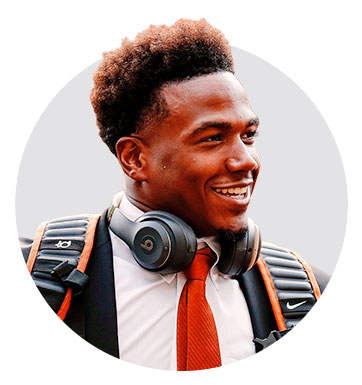 Tre Watson, Texas running back: All we hear is people yelling. I think somebody told us Bevo had just tried to attack the bulldog, and we were lit. We were yelling, “Let’s go Bevo!”
Tre Watson, Texas running back: All we hear is people yelling. I think somebody told us Bevo had just tried to attack the bulldog, and we were lit. We were yelling, “Let’s go Bevo!”
 Temple Grandin, animal expert: A longhorn can learn to tolerate that environment, but this was a brand-new stadium, and that’s part of the problem. At home, he’d be used to it, but now you’ve got him in a strange place in a makeshift enclosure, and that probably led to the problem. I’ve seen show steers get upset at just trade show banners on tables. Sudden novelty scares him.
Temple Grandin, animal expert: A longhorn can learn to tolerate that environment, but this was a brand-new stadium, and that’s part of the problem. At home, he’d be used to it, but now you’ve got him in a strange place in a makeshift enclosure, and that probably led to the problem. I’ve seen show steers get upset at just trade show banners on tables. Sudden novelty scares him.
 Sigmon: Bevo’s butt was facing where the dog was, and he spun around, and when he saw the dog, he flipped the New Orleans police barricade, just one-horned it, and flung it like it was a bug.
Sigmon: Bevo’s butt was facing where the dog was, and he spun around, and when he saw the dog, he flipped the New Orleans police barricade, just one-horned it, and flung it like it was a bug.
 Galindo: I’m shocked there were photographers near the pen with their backs toward Bevo at that moment.
Galindo: I’m shocked there were photographers near the pen with their backs toward Bevo at that moment.
 Seiler: There were cameras on tripods. There were people laying down. Some of those sideline guys are nuts. They get taken out by players all the time.
Seiler: There were cameras on tripods. There were people laying down. Some of those sideline guys are nuts. They get taken out by players all the time.
 Sigmon: I’m behind the golf cart. The golf cart is between me, the dog and Bevo. The people with wide-angle lenses right up front, I wasn’t going to be one of those people.
Sigmon: I’m behind the golf cart. The golf cart is between me, the dog and Bevo. The people with wide-angle lenses right up front, I wasn’t going to be one of those people.
 Wang: Initially, I heard a woman start screaming. At that time, Uga had started squatting, so I thought it was because she thought he was going to use the restroom on the field.
Wang: Initially, I heard a woman start screaming. At that time, Uga had started squatting, so I thought it was because she thought he was going to use the restroom on the field.
 Kirby Smart, Georgia head coach: I was worried for Uga, to be honest.
Kirby Smart, Georgia head coach: I was worried for Uga, to be honest.
 Seiler: Uga was sitting down waiting to have his picture made, and I don’t even think he knew Bevo was behind him. Then I heard a lady scream, and I turned around, and saw people dashing. I wasn’t going to wait around, so I just pulled away the dog. In some of those pictures, it looks like Bevo’s like 2 feet from us, but actually he was never within 10 feet of us.
Seiler: Uga was sitting down waiting to have his picture made, and I don’t even think he knew Bevo was behind him. Then I heard a lady scream, and I turned around, and saw people dashing. I wasn’t going to wait around, so I just pulled away the dog. In some of those pictures, it looks like Bevo’s like 2 feet from us, but actually he was never within 10 feet of us.
 Griffin: The biggest thing I really remember was his horn went over this — I think she was a photographer. I just remember her ducking, and the horn going right over her head.
Griffin: The biggest thing I really remember was his horn went over this — I think she was a photographer. I just remember her ducking, and the horn going right over her head.
 Wang: I started standing up and thought, “Oh, it’s fine,” so squatted back down, and if you watch the video in slow-mo, you’ll see me kind of duck and the horn barely scrapes by me. I didn’t realize the horn hit me until someone pointed it out on Reddit.
Wang: I started standing up and thought, “Oh, it’s fine,” so squatted back down, and if you watch the video in slow-mo, you’ll see me kind of duck and the horn barely scrapes by me. I didn’t realize the horn hit me until someone pointed it out on Reddit.
 Griffin: She was still doing her job. That’s funny. I thought she was ducking like, “Oh my god.”
Griffin: She was still doing her job. That’s funny. I thought she was ducking like, “Oh my god.”
 Tomlinson: The thing that makes me laugh every time is there were like three announcers, and they’re clearly mocking and enjoying this moment as it leads up to it, talking about it being like the royal wedding. But when it happened, they reverted to football announcers, because one of the guys immediately said, “That’s targeting.”
Tomlinson: The thing that makes me laugh every time is there were like three announcers, and they’re clearly mocking and enjoying this moment as it leads up to it, talking about it being like the royal wedding. But when it happened, they reverted to football announcers, because one of the guys immediately said, “That’s targeting.”
On the TV feed, the incident is largely played for laughs. Galindo compared it to the meme of Joe Rogan reacting at a UFC fight — hugging, laughing, screaming, chaos.
 Galindo: We’re actually on the sideline with a monitor in front of us. We saw Uga come behind us to go see Bevo, but then we’re just watching everything on the monitor.
Galindo: We’re actually on the sideline with a monitor in front of us. We saw Uga come behind us to go see Bevo, but then we’re just watching everything on the monitor.
 Griffin: They take Uga out of his crate, and all of a sudden, Bevo is out to destroy.
Griffin: They take Uga out of his crate, and all of a sudden, Bevo is out to destroy.
 Shipley: Bevo just kind of squared up and went after him, and he wasn’t going to take “no” for an answer.
Shipley: Bevo just kind of squared up and went after him, and he wasn’t going to take “no” for an answer.
 Griffin: You’re like, “Oh s—, if Bevo gets loose, where the hell is he going?”
Griffin: You’re like, “Oh s—, if Bevo gets loose, where the hell is he going?”
Pre-Game things getting heated 👀 between @FootballUGA and @TexasFootball #bevo #uga pic.twitter.com/K1eNw4Ir4S
— Holly Rowe (@sportsiren) January 2, 2019
 Shipley: One of the things they thought was funny about it was the game I ran into Bevo, and they were saying, “It’s a good thing Bevo didn’t treat you like he treated Uga.”
Shipley: One of the things they thought was funny about it was the game I ran into Bevo, and they were saying, “It’s a good thing Bevo didn’t treat you like he treated Uga.”
 Galindo (on the ESPN broadcast): Can live television get better than that? No!
Galindo (on the ESPN broadcast): Can live television get better than that? No!
 Hager: The only thing I’ve ever really showed my girlfriend from my football career is that video.
Hager: The only thing I’ve ever really showed my girlfriend from my football career is that video.
 Galindo: I love it, man. That’s what college sports are about — the insanity, the fans, the mascots, the players. So if I’m associated with [the Bevo call] more than anything, I don’t care. I think it’s hilarious.
Galindo: I love it, man. That’s what college sports are about — the insanity, the fans, the mascots, the players. So if I’m associated with [the Bevo call] more than anything, I don’t care. I think it’s hilarious.
Ultimately, the entire incident lasts just a few seconds before Bevo’s handlers, the Silver Spurs, get control of the situation, and the TV clip ends with Galindo and Co. repeating the phrase that’s now tethered to the incident in college football lore: That. Was. Awesome.
 Watson: I didn’t see it until after the game. We were all talking about it. Bevo really tried to go get him. I just thought it was a nice easy buck. No. That boy was about to lose his life on live television.
Watson: I didn’t see it until after the game. We were all talking about it. Bevo really tried to go get him. I just thought it was a nice easy buck. No. That boy was about to lose his life on live television.
 Wagner: People right there understood the gravity of it, of how it could’ve been. It was just chaos. That moment, the entire night, the following day. It was a story I’ll tell for the rest of my life.
Wagner: People right there understood the gravity of it, of how it could’ve been. It was just chaos. That moment, the entire night, the following day. It was a story I’ll tell for the rest of my life.
 Griffin: That whole conversation that’s always been said, “Is Bevo drugged up and that’s why he’s so tame during the games?” Now you see that and you’re like, “No, I don’t think he’s drugged.”
Griffin: That whole conversation that’s always been said, “Is Bevo drugged up and that’s why he’s so tame during the games?” Now you see that and you’re like, “No, I don’t think he’s drugged.”
 Hager: I was actually a Silver Spur. I’ve been very close to Bevo, and there was never, in the four years I was playing, a moment when I thought Bevo was going to do anything out of the ordinary, let alone attack the other team’s mascot. It’s really impressive how they’re able to handle an animal like that, especially in a time when that skill of the true cowboy is kind of lost.
Hager: I was actually a Silver Spur. I’ve been very close to Bevo, and there was never, in the four years I was playing, a moment when I thought Bevo was going to do anything out of the ordinary, let alone attack the other team’s mascot. It’s really impressive how they’re able to handle an animal like that, especially in a time when that skill of the true cowboy is kind of lost.
 Sigmon: They professionally took care of it. They got the dog safe, and they got Bevo back behind the barricade. But I’m guessing that won’t happen again.
Sigmon: They professionally took care of it. They got the dog safe, and they got Bevo back behind the barricade. But I’m guessing that won’t happen again.
 Rowe: I think there was a moment we were all talking and saying, “Wow, that could have gone really badly.” Kudos to the handlers.
Rowe: I think there was a moment we were all talking and saying, “Wow, that could have gone really badly.” Kudos to the handlers.
 Galindo: I want to make sure people know how professional and well trained all the people around Bevo are. But at the end of the day, it is a massive animal. But Ricky Brennes and all those guys, it is shocking how detailed everything is. It’s like the Secret Service preparing for the president to arrive somewhere.
Galindo: I want to make sure people know how professional and well trained all the people around Bevo are. But at the end of the day, it is a massive animal. But Ricky Brennes and all those guys, it is shocking how detailed everything is. It’s like the Secret Service preparing for the president to arrive somewhere.
 Seiler: At some point, I took the dog back over there, and we did get a picture.
Seiler: At some point, I took the dog back over there, and we did get a picture.
There was, of course, still a game to play, and while no one can say for sure whether Bevo’s charge changed the outcome, the folks at Texas certainly believe it did. Texas, a 12.5-point underdog, pulled off the upset win, 28-21.
 Griffin: It was a lot for Texas getting into the Sugar Bowl, but everybody was talking about Georgia being upset, because they weren’t in the College Football Playoff.
Griffin: It was a lot for Texas getting into the Sugar Bowl, but everybody was talking about Georgia being upset, because they weren’t in the College Football Playoff.
 Hager: I just remember them being overhyped, and Georgia was going to kill us, and all my friends from Georgia were telling me we were going to get beat pretty bad. And before kickoff, to see our beloved Bevo setting the tone, I think it helped us go out there more relaxed and excited and aggressive.
Hager: I just remember them being overhyped, and Georgia was going to kill us, and all my friends from Georgia were telling me we were going to get beat pretty bad. And before kickoff, to see our beloved Bevo setting the tone, I think it helped us go out there more relaxed and excited and aggressive.
 Davis: College football fans will rally around anything. Bevo charging a little puppy became a rallying cry that night. It became a symbol before they beat a Georgia team no one thought they’d beat.
Davis: College football fans will rally around anything. Bevo charging a little puppy became a rallying cry that night. It became a symbol before they beat a Georgia team no one thought they’d beat.
 Watson: Our mascot was ready to go to war with their mascot on full live television. Bevo got us rolling. That was the start and set the tone that we were going to step on some Bulldogs’ necks that day.
Watson: Our mascot was ready to go to war with their mascot on full live television. Bevo got us rolling. That was the start and set the tone that we were going to step on some Bulldogs’ necks that day.
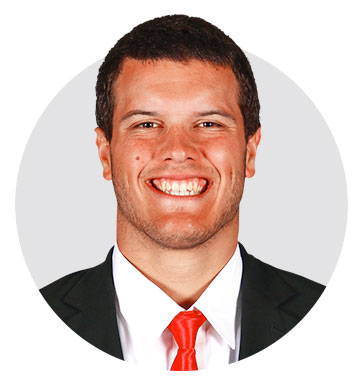 Charlie Woerner, Georgia tight end: I remember them showing it on the Jumbotron. Bevo knocked over a fence. It was crazy. I was like, “Dang, I’m glad Uga is OK.”
Charlie Woerner, Georgia tight end: I remember them showing it on the Jumbotron. Bevo knocked over a fence. It was crazy. I was like, “Dang, I’m glad Uga is OK.”
 Hager: Coming in from warming up, it went viral around the locker room. And the main point was, “How can we lose if Bevo’s bossing up like that?”
Hager: Coming in from warming up, it went viral around the locker room. And the main point was, “How can we lose if Bevo’s bossing up like that?”
 Griffin: Texas goes on to win the game, and everybody’s like, “It’s because Bevo showed attitude.”
Griffin: Texas goes on to win the game, and everybody’s like, “It’s because Bevo showed attitude.”
 Smart: The incident comes to light because of all the videos since, but I don’t recall it having any impact on us or seeing it prior to the game.
Smart: The incident comes to light because of all the videos since, but I don’t recall it having any impact on us or seeing it prior to the game.
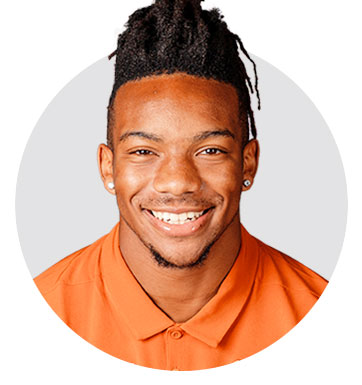 Bijan Robinson, top recruit and future Texas tailback: I wasn’t there when Bevo attacked, but I saw it live on TV. I was like, “That’s the scariest thing for that dog to get attacked by an absolute gigantic mammal.” From that moment, I was like, “I’m going to Texas.”
Bijan Robinson, top recruit and future Texas tailback: I wasn’t there when Bevo attacked, but I saw it live on TV. I was like, “That’s the scariest thing for that dog to get attacked by an absolute gigantic mammal.” From that moment, I was like, “I’m going to Texas.”
 Rodrigo Blankenship, Georgia kicker: There was a whole lot of content that said, “This sums up the Texas-Georgia game.”
Rodrigo Blankenship, Georgia kicker: There was a whole lot of content that said, “This sums up the Texas-Georgia game.”
Part III: The aftermath
The game itself became something of an afterthought, while the clip of Bevo’s brashness was a sensation. It spread across social media like wildfire, led “SportsCenter,” and it was Scott Van Pelt’s “Best Thing I Saw” that night. Texas fans immediately adopted the image as the perfect symbol of the state and the school’s ethos of toughness.
 Seiler: Rick called me and apologized. I said, “Did you get some good pictures?” He said he thinks that, because Bevo got to the arena like six hours before the game started and hadn’t moved from that spot, he just got worn out from staring at a wall. He just wanted to go for a stroll. I don’t think the cow ever even saw the dog, because there were too many people around.
Seiler: Rick called me and apologized. I said, “Did you get some good pictures?” He said he thinks that, because Bevo got to the arena like six hours before the game started and hadn’t moved from that spot, he just got worn out from staring at a wall. He just wanted to go for a stroll. I don’t think the cow ever even saw the dog, because there were too many people around.
 Galindo: In the moment, we thought it was hilarious and cool and funny. But we really didn’t realize it was that big a deal until we got back to the hotel and at the bar, every TV was on “SportsCenter,” and they’re showing basically my play call.
Galindo: In the moment, we thought it was hilarious and cool and funny. But we really didn’t realize it was that big a deal until we got back to the hotel and at the bar, every TV was on “SportsCenter,” and they’re showing basically my play call.
 Davis: This probably says a lot about the industry or how terrible a person I am, but this happens, and the first thing I think is, “Did I get it on camera?” And then, “This is content gold I have here.”
Davis: This probably says a lot about the industry or how terrible a person I am, but this happens, and the first thing I think is, “Did I get it on camera?” And then, “This is content gold I have here.”
 Seiler: I had a photographer come up and say, “Look what Bevo did to me.” He pulled up his shirt, and the guy had a big gash down his back.
Seiler: I had a photographer come up and say, “Look what Bevo did to me.” He pulled up his shirt, and the guy had a big gash down his back.
 Wagner: People were just coming up to me in the press room like, “Can I see your back?” My brother, Peter, had a good line that night in the family group text: “Nick I’ve seen your back more times today than I have in my entire life, and we used to share a room.”
Wagner: People were just coming up to me in the press room like, “Can I see your back?” My brother, Peter, had a good line that night in the family group text: “Nick I’ve seen your back more times today than I have in my entire life, and we used to share a room.”
 Davis: Nick’s health and wellbeing, I didn’t even think about it at first. Then someone was like, “What happened with Nick?” and I was like, “Oh, s—, I should check on him.”
Davis: Nick’s health and wellbeing, I didn’t even think about it at first. Then someone was like, “What happened with Nick?” and I was like, “Oh, s—, I should check on him.”
 Wagner: On the workman’s comp form, it asks why you’re receiving treatment, and I just wrote, “Hit by cow.”
Wagner: On the workman’s comp form, it asks why you’re receiving treatment, and I just wrote, “Hit by cow.”
 Wang: Nick and I always joked that we really wish our careers were something more than this meme, but at the same time, I’ll share it.
Wang: Nick and I always joked that we really wish our careers were something more than this meme, but at the same time, I’ll share it.
 Griffin: [Wang] probably has a bright future ahead of her, but now she’s known as the lady who almost got killed by Bevo. When she has kids, they’ll be like, “Hey, you know my mom almost got killed by Bevo, right?”
Griffin: [Wang] probably has a bright future ahead of her, but now she’s known as the lady who almost got killed by Bevo. When she has kids, they’ll be like, “Hey, you know my mom almost got killed by Bevo, right?”
 Davis: It’s been a long-running joke that I peaked that night.
Davis: It’s been a long-running joke that I peaked that night.
Bevo is not here for this mascot meeting. #HookEm pic.twitter.com/KXgaQzGm0W
— Danny Davis (@_dannydavis) January 2, 2019
 Wang: When it first happened, I’d get responses on dating apps like, “Was that you?” My résumé at the bottom on special interests says, “Dodging mascots.”
Wang: When it first happened, I’d get responses on dating apps like, “Was that you?” My résumé at the bottom on special interests says, “Dodging mascots.”
 Galindo: Every year we’d do three or four Longhorn Network promos before the start of the football season. We wanted to play off it, so we did a piece where it was, “Bring your dog to work day.” It was Ricky [Williams], Ship, me and Griff, and we’re all walking our actual dogs on the field at DKR. Ricky and Ship have bulldogs. So we’re walking our dogs, then cut to a shot from behind us of Bevo coming in frame. We all turn and walk the other way like, “Nope, not a good idea.”
Galindo: Every year we’d do three or four Longhorn Network promos before the start of the football season. We wanted to play off it, so we did a piece where it was, “Bring your dog to work day.” It was Ricky [Williams], Ship, me and Griff, and we’re all walking our actual dogs on the field at DKR. Ricky and Ship have bulldogs. So we’re walking our dogs, then cut to a shot from behind us of Bevo coming in frame. We all turn and walk the other way like, “Nope, not a good idea.”
But ultimately, there’s no arguing the color, tradition and, occasionally, unpredictability, live mascots bring to the sport.
 Stratton: I do think [Ralphie] enjoys it. She’s a 1,000-pound animal, and we use only positive reinforcement, so at the end of the day, we’re not making this buffalo do anything she doesn’t want to do. We can’t make her do anything she doesn’t want to do. … I’ve had so many people come up to me and say, no matter how many times they see Ralphie run, they still get goosebumps. These animals are so special. They’re domestic, but they’re still just a little bit wild. And I think that speaks to our campus. It just gets your adrenaline going to watch four or five crazy college kids hold on to a buffalo for dear life. Who thinks that’s a good idea? But it’s me. I did it, and I love it.
Stratton: I do think [Ralphie] enjoys it. She’s a 1,000-pound animal, and we use only positive reinforcement, so at the end of the day, we’re not making this buffalo do anything she doesn’t want to do. We can’t make her do anything she doesn’t want to do. … I’ve had so many people come up to me and say, no matter how many times they see Ralphie run, they still get goosebumps. These animals are so special. They’re domestic, but they’re still just a little bit wild. And I think that speaks to our campus. It just gets your adrenaline going to watch four or five crazy college kids hold on to a buffalo for dear life. Who thinks that’s a good idea? But it’s me. I did it, and I love it.
 Smart: So many people respect the long history and tradition of each Uga. They’re buried in our stadium. They’re right there. He’s part of the fabric of our culture.
Smart: So many people respect the long history and tradition of each Uga. They’re buried in our stadium. They’re right there. He’s part of the fabric of our culture.
 Steve Sarkisian, Texas head coach: Bevo brings a ton of pride to our program and is such a great symbol of the power, strength and determination of Texas football. One of our mantras is “Tough All Day,” and that’s what Bevo is and represents.
Steve Sarkisian, Texas head coach: Bevo brings a ton of pride to our program and is such a great symbol of the power, strength and determination of Texas football. One of our mantras is “Tough All Day,” and that’s what Bevo is and represents.